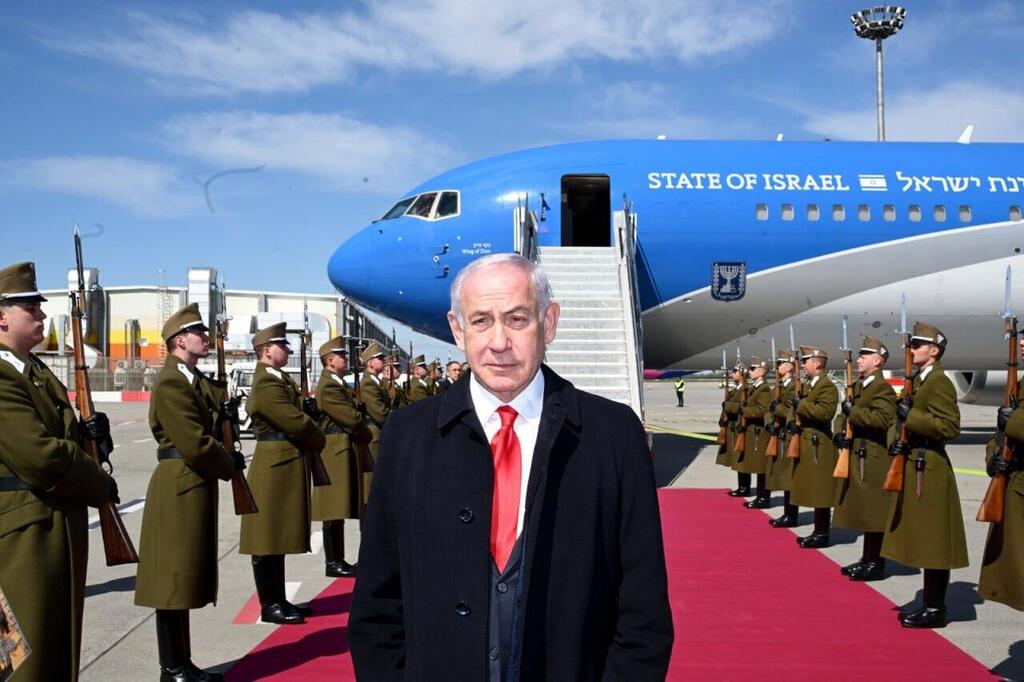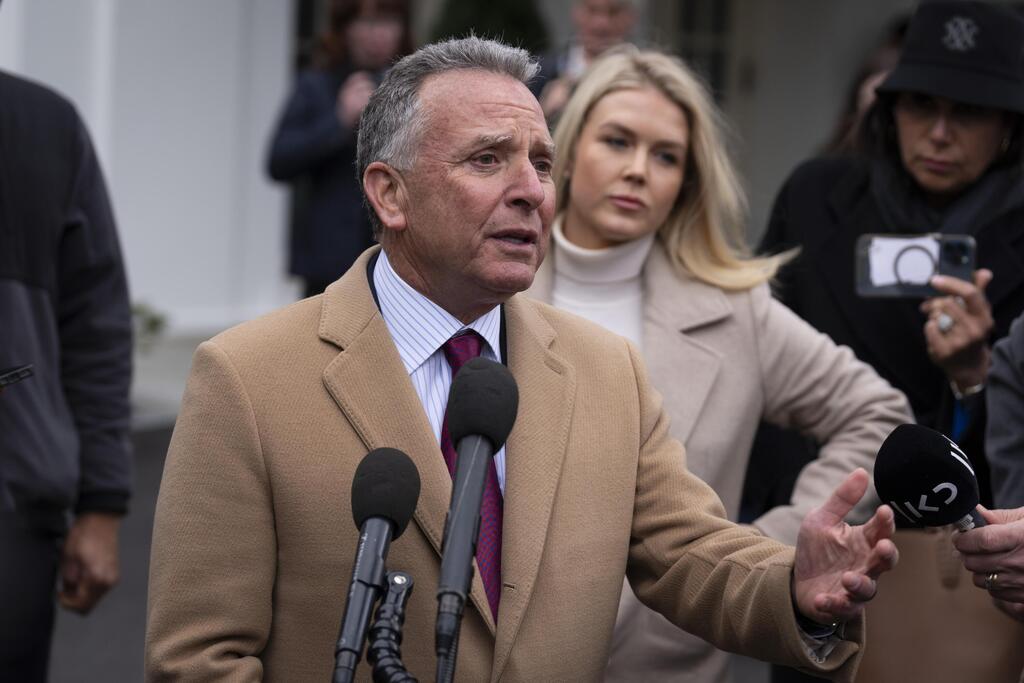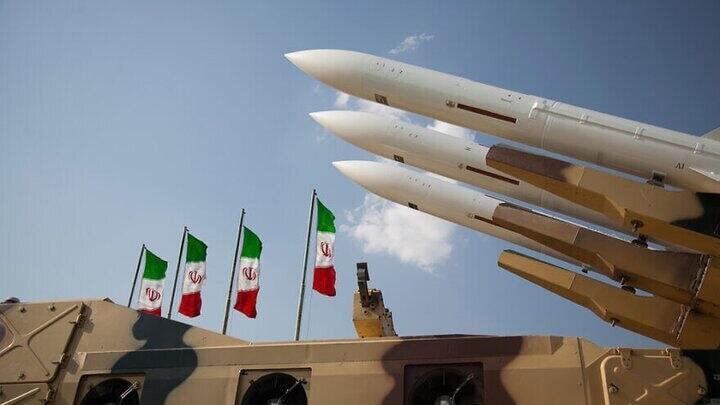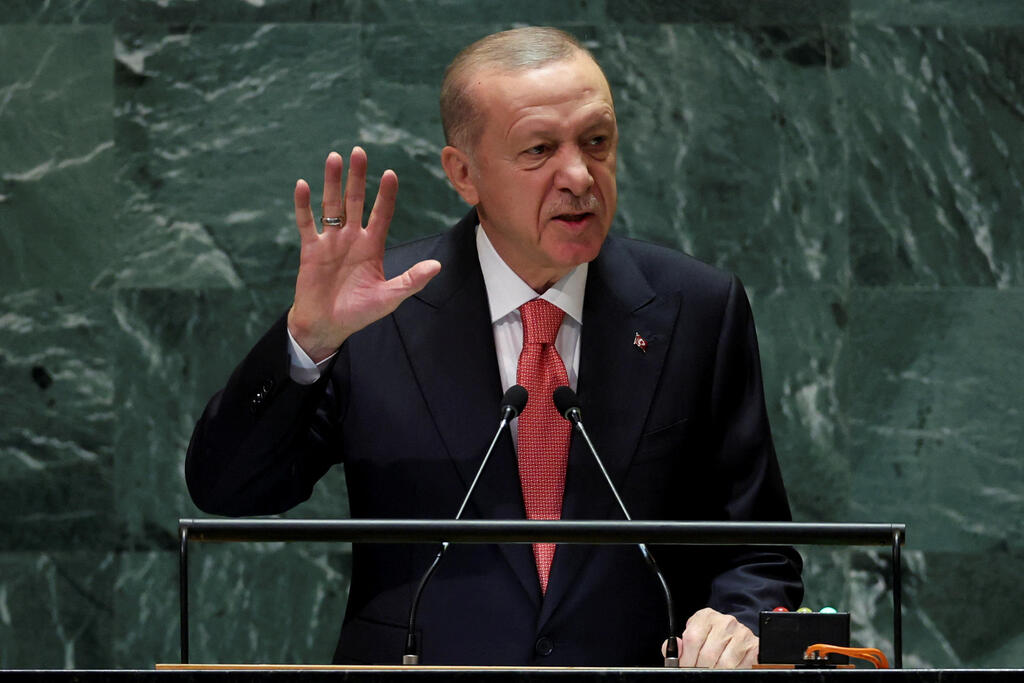Prime Minister Benjamin Netanyahu departed for Washington on Sunday afternoon for a two-day visit during which he is scheduled to meet U.S. President Donald Trump.
The meeting, set for 8 p.m. Monday Israel time at the White House, is expected to focus on a range of strategic issues—economic, diplomatic and security-related—with particular emphasis on the hostage crisis, the Iranian threat, Israeli concerns over Turkish influence in Syria and the ongoing tariff dispute, officially cited as the reason for the visit.
With Witkoff at hand
The presence of Steve Witkoff, Trump’s envoy and the lead U.S. official on the hostage issue, has fueled expectations that the release of Israeli hostages held by Hamas in Gaza will dominate the meeting. Israeli officials believe Witkoff, seen as a key figure in the negotiations, is part of a coordinated push through Washington to pressure mediators Qatar and Egypt.
Currently on the table, according to these sources, is a framework that ranges between Hamas' reported willingness to release five living hostages and Witkoff’s plan, which calls for the release of 11.
While the United States has supported Israel’s resumption of military pressure in Gaza, that backing is not without limits, particularly as the Palestinian death toll continues to rise and international calls for restraint intensify. Trump, meanwhile, is pursuing a broader strategic goal—normalization of ties between Israel and Saudi Arabia. Achieving that would require quiet in Gaza and a resolution to the hostage crisis, both of which are time-sensitive if Trump intends to visit Riyadh in just over a month.
In Jerusalem, officials view direct U.S. involvement—especially Witkoff’s—as a critical tool for increasing pressure on Hamas and advancing toward a deal. Netanyahu is expected to ask Trump to use his influence with regional partners while also projecting firm American backing for Israeli positions. The goal is to dissuade Hamas from miscalculating that there are disagreements between Jerusalem and Washington.
An Israeli official commenting on the negotiations said, “There is movement on the part of Hamas. Military pressure is having an effect. We’re making a major effort to secure the release of as many hostages as possible, and we’re not ruling out the possibility of a development before the holiday—but there are no guarantees. We’re dealing with monsters.”
Economy takes top priority
Netanyahu’s visit comes against the backdrop of a global economic crisis, fueled in part by sweeping new tariffs imposed by the United States on numerous countries, including Israel. According to Israeli diplomatic sources, Jerusalem had attempted to avoid being targeted by lifting tariffs on American goods but encountered firm resistance from the Trump administration.
5 View gallery
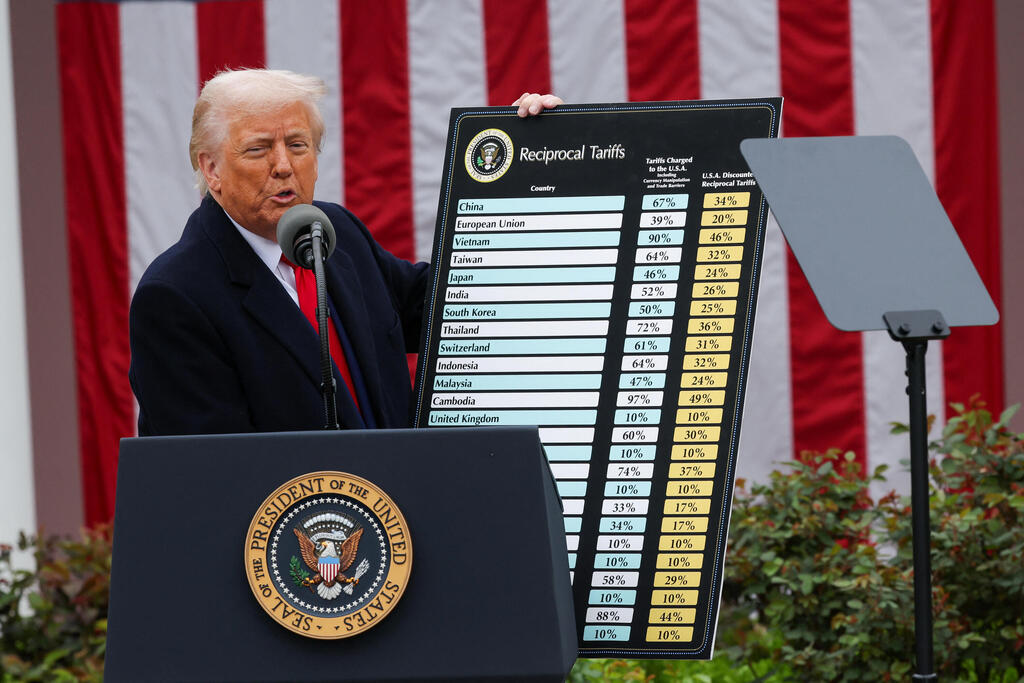

US President Donald Trump presents his sweeping tariff policy
(Photo: REUTERS/Carlos Barria)
In Washington, Netanyahu is also expected to meet with U.S. Commerce Secretary Howard Lutnick, who is leading President Trump’s trade policy, in an effort to mitigate the impact on Israeli industry. Officials close to the prime minister expressed concern over sharp declines on the Tel Aviv Stock Exchange and the growing economic strain on Israeli citizens. Netanyahu is seeking either to resolve the dispute or, at the very least, minimize the damage.
Iran and regional threats high on the agenda
The Iranian threat is also expected to feature prominently in talks, with Israel viewing recent developments as grounds for deeper strategic coordination with Washington. Israeli officials fear that Trump’s pressure tactics may prompt Iran to accelerate its nuclear program. They believe it is crucial to coordinate a response in case American-led efforts to negotiate a new nuclear deal fall through.
Trump’s meeting with Netanyahu is seen in part as a move to ensure the two leaders are aligned on how to handle the Iranian threat and to avoid surprises. Coordination is considered vital for addressing sensitive questions that could arise if diplomacy fails—such as who would strike Iran’s nuclear facilities and when, and whether Israel and the U.S. would act together.
While Trump may prefer to avoid military action and continue diplomatic engagement, the timeline for such efforts remains a key point of discussion. Netanyahu is skeptical that diplomacy can succeed and believes Tehran has misled the Americans. Still, he trusts that Trump will not allow Iran to cross the nuclear threshold.
Israeli diplomatic sources also noted that Witkoff’s involvement may reflect broader U.S. efforts to leverage regional and European pressure on Iran—not only to advance a hostage deal, but also to curb Tehran’s growing influence in the region.
Concern over Turkish presence in Syria
The issue of Israel-Turkey relations is also expected to come up during Netanyahu’s visit, particularly in light of Turkey’s growing involvement in Syria and its potential impact on Israel’s northern border. Officials in Jerusalem have expressed concern over Ankara’s increasing ties with the administration of Ahmad al-Sharaa and a reported agreement to establish drone bases in Syria. In response, Israel reportedly struck Syria’s T4 airbase to prevent or delay the construction of such a facility.
Over the weekend, Israeli and Turkish leaders exchanged messages aimed at de-escalating tensions, with both sides indicating they are not interested in a confrontation. Still, significant mediation by President Trump may be required to prevent further deterioration. Netanyahu is expected to brief Trump on updated intelligence assessments regarding the situation.
Coordinating strategy on International Criminal Court
Netanyahu also plans to discuss efforts to expand the number of countries withdrawing from the Rome Statute of the International Criminal Court in The Hague, following Hungary’s announcement to that effect. Israel hopes to coordinate its position with Washington and explore ways to counter legal proceedings promoted by several nations against senior Israeli officials. The governments of the Czech Republic and Argentina are seen as potential next candidates to exit the treaty.
The meeting between Netanyahu and Trump is viewed in Jerusalem as a rare opportunity to align with Israel’s key ally on sensitive legal and strategic matters, extending the conversation beyond the current tariff crisis.
The initiative for the meeting, which was sparked by the tariff dispute, underscores the depth of the relationship between the two leaders and their ability to turn a crisis into a broader strategic discussion. Netanyahu has expressed pride in being the first foreign leader invited to meet with Trump since his return to the White House.
Among the central questions expected to be addressed are whether progress will be made on the hostage crisis, whether a resolution to the tariff issue can be found, and whether the two leaders can reach an understanding on halting Iran’s nuclear progress. Answers to these questions are likely to begin emerging following Monday night’s meeting at the White House.



